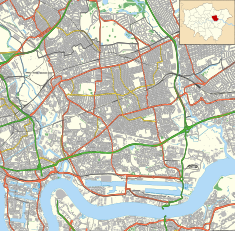The Royal Albert Dock is one of three docks in the Royal Group of Docks of East London in the United Kingdom.
| Royal Albert Dock | |
|---|---|
 University of East London Docklands Campus, on the Royal Albert Dock | |
| Location | London |
| Coordinates | 51°30′24″N 0°03′15″E / 51.5066°N 0.0542°E |
| Built | 1880 |
| Architect | Sir Alexander Rendel |
History
edit19th century – establishment
editThe dock, which was designed by Sir Alexander Rendel as an extension to the Victoria Dock, was constructed by Lucas and Aird and completed in 1880.[1] Two dry docks and machine shops were established to the south at the western end for ship repairs by R & H Green & Silley Weir (later River Thames Shiprepairs Ltd).[2]
Late 20th century – decline and limited redevelopment
editFrom the 1960s onwards, the Royal Albert Dock experienced a steady decline – as did all of London's other docks – as the shipping industry adopted containerisation, which effectively moved traffic downstream to Tilbury. It finally closed to commercial traffic along with the other Royal Docks in 1981.[3]
Redevelopment in the late 20th century included the construction of London City Airport which was built on the south bank of the dock with a single runway and completed in 1987.[4] At the eastern end of the north bank the University of East London Docklands Campus opened in 1999.[5][6] Redevelopment also included the London Regatta Centre which was built at the western end of the north bank and opened in 2000.[7] In the early 20th century 'Building 1000' was built on the north bank of the dock at a cost of £70 million and was completed in 2004.[4]
Early 21st century
edit- Failed redevelopment (2013–2023)
In May 2013, the Mayor of London, Boris Johnson, announced a development of the Royal Albert Dock, claimed to be worth £6 billion to the capital's economy and creating over 20,000 jobs.[8] The developer was to be Shanghai-based ABP (Advanced Business Park), with CITIC Construction assigned as main contractor, and Multiplex assigned as principal sub-contractor. Boris Johnson promised that the development would be the "next Canary Wharf", serving as a gateway for Asian and Chinese businesses, creating 20,000 jobs and adding £6 billion to the UK economy.[9] Johnson named the main road serving the development "Mandarin Street" to attract Chinese businesses.[10]
Construction officially began in June 2017.[11][12] Phase 1 of the project was completed in the first quarter of 2018, consisting of 21 buildings with 460,000 sq ft of office space and 140,000 sq ft of retail and public realm.[13] Phase 2 was designed to begin late 2020, consisting of further office and retail spaces, along with residential units and membership clubs.[14]
However, in February 2022, unable to live up to Boris Johnson's promises, the business park was instead described as a half finished, abandoned and mostly empty "ghost town" and white elephant with less than 10% of units ever being occupied.[15] It has become a favoured filming location "because there are never any people around".[10]
The Financial Times suggested in early 2022 that, "the Albert Dock development owned by Beijing-based Advanced Business Park, is on the brink of collapse after creditors appointed administrators to recover unpaid debts".[16]
- Renewed redevelopment (2024–present)
In July 2022, PwC was appointed as liquidator to 23 companies within the ABP Group and the development was subsequently sold to property firm DPK led by armature jockey David Maxwell.[17] In February 2024, it was revealed that two of the blocks would be converted into student accommodation, with the remaining blocks being repurposed for office, research, healthcare and educational uses. Thirty acres of derelict land adjacent to the scheme remains in GLA ownership.[9][18]
See also
editReferences
edit- ^ "Royal Albert Dock". Port Cities. Retrieved 30 November 2019.
- ^ "Green And Silley Weir - a Memory of East Ham". Francis Frith. Retrieved 30 November 2019.
- ^ "History". London's Royal Docks. Retrieved 30 November 2019.
- ^ a b "The Royals". BBC. Retrieved 30 November 2019.
- ^ "University of East London Olympic Partnerships". Archived from the original on 23 September 2010.
- ^ "News". University of East London.
- ^ "I won a silver medal at the Olympics... after being told that I would never row for my country". Henley Standard. 3 July 2017. Retrieved 8 June 2019.
- ^ "Mayor announces £1bn deal to transform Royal Albert Dock | London City Hall". London.gov.uk. Retrieved 30 November 2019.
- ^ a b Wright, Charles (2 February 2024). "Charles Wright: Is there fresh hope for the Royal Albert Dock?".
- ^ a b Wainwright, Oliver (20 July 2022). "'It's been a disaster': how Boris Johnson's docklands business hub turned into a ghost town". The Guardian.
- ^ Laurel Demkovich. "Groundbreaking ceremony marks start of £1.7bn ABP development in Royal Docks | Latest Newham News". Newham Recorder. Retrieved 30 November 2019.
- ^ "Brookfield Multiplex set for £240m Royal Docks job". Construction Enquirer. Retrieved 30 November 2019.
- ^ "Masterplan | RAD". Rad.london. Retrieved 30 November 2019.
- ^ Sophie Morton. "ABP chairman Xu Weiping pledges commitment to £1.7bn Royal Albert Dock business district | Latest Newham News". Newham Recorder. Retrieved 30 November 2019.
- ^ Jessel, Ella (11 February 2022). "Behind the story: How did Boris's business park become a ghost town?". Architects' Journal. Retrieved 11 February 2022.
- ^ Hammond, George (11 February 2022). "Chinese developers selling off more London property to raise cash". Financial Times. Retrieved 30 December 2022.
- ^ "PwC appointed as liquidators to 23 companies within the ABP Group - developers of the Royal Albert Dock site". PwC. 14 July 2022.
- ^ Lydall, Ross (7 March 2024). "£2bn plan unveiled to bring the Royal Docks back to life". Evening Standard.
